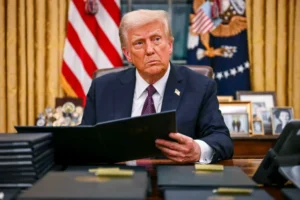As the political world prepares after one of the most polarizing elections in history, speculation abounds regarding Donald J. Trump’s goals for his return to the White House in 2025. The former president, a businessman-turned-politician, left a legacy that expanded far beyond the walls of Congress or the Oval Office, with implications that rippled into various sectors of the economy. One pivotal question that’s already sparking conversation among analysts, business leaders, and political theorists revolves around the relationship between government and business during his administration: Will the Trump 2025 presidency usher in a new era for government-linked firms?
To answer this question, it’s important to consider Trump’s history in politics, his business-oriented approach to governance, and the potential policy shifts that could emerge from his unique leadership style. Below, we analyze what might change in a second Trump administration for businesses that operate in close proximity to the levers of government power, as well as what it could mean for the future of public-private partnerships.
A Quick Look Back: Business in Trump’s First Term
During his first presidency (2017-2021), Donald Trump garnered attention for his distinctively pro-business stance, frequently touting deregulation, tax reforms, and economic growth. Business-friendly reforms were often at the forefront of his agenda, such as:
- Corporate Tax Cuts (2017): The signature legislative achievement of Trump’s term, the Tax Cuts and Jobs Act, reduced the corporate tax rate from 35% to 21%. This reform was celebrated by corporations across industries, with many citing revenue growth and increased global competitiveness as direct benefits.
- Reduced Regulations: Trump campaigned on the idea of lowering governmental “red tape,” and he followed through on that promise, repealing or revising numerous environmental and financial regulations. Government-linked industries like oil, gas, defense contracting, and pharmaceuticals saw tangible benefits, with sectors like energy flourishing.
- Focus on U.S.-Based Production: Trump’s “America First” agenda emphasized reshoring jobs and prioritizing domestic production. Companies involved in manufacturing, transportation, infrastructure, and military technologies often benefited from increased government contracts.
While Trump’s policies rewarded many sectors, they also drew criticism for favoring large corporations. Critics argued that these changes widened economic inequality, and many policy decisions were perceived as benefiting industries and companies with personal ties to the Trump administration.
The Potential Impact of a Trump 2025 Administration
Now that Trump has returned to the White House in 2025, many questions loom about whether the trends of his first term will intensify or evolve. A new Trump administration could directly or indirectly impact businesses connected to government initiatives. Here’s a closer look at potential outcomes for several sectors.
1. Defense and Military Contracting: A Continued Boom?
One of the most significant hallmarks of Trump’s time in office was an increase in defense spending. From 2017 to 2020, the Pentagon budget grew substantially under his watch, much of it directed toward private contractors with billions in government contracts. Notable companies such as Lockheed Martin, Boeing, and Raytheon benefited from these expansions.
The Trump 2025 presidency may see a continuation of this trend. Trump has consistently advocated for a robust national defense program, including modernized weaponry, advanced aerospace technologies, and cybersecurity enhancements. With geopolitical challenges like tensions in the South China Sea and the ongoing security concerns with Russia, Trump may further prioritize funding for private defense contractors.
That said, such moves would likely reinvigorate debates around over-reliance on military-industrial firms and the ethics of profiting from government-funded war machinery.
2. Energy: A Return to Fossil Fuel Prioritization
Under Trump’s first administration, the energy sector experienced policy shifts aimed at boosting fossil fuel production—a stark contrast to the Biden administration’s pivot toward renewable energy and combating climate change. Trump frequently touted the importance of U.S. energy independence and directly supported coal, oil, and natural gas producers through deregulation.
With Trump’s return in 2025, one could expect a reinvigorated push for traditional energy sources and a rollback of green energy mandates. Expect fracking, drilling, and coal mining industries to find renewed favor in government policy. Government-linked energy firms or those competing for federal drilling rights could see tremendous contract opportunities, though such moves could spark criticism from environmental organizations and renew global concerns about U.S. climate commitments.
3. Infrastructure: Promises of a Rebuilding Boom
Infrastructure was a constant theme of Trump’s first presidency, frequently touted as a high priority, though significant legislation never materialized. Trump often pointed to the need for substantial upgrades to roads, bridges, and broadband networks to strengthen the U.S. economy and create jobs.
In the Trump 2025 administration, infrastructure could take center stage. Companies involved in construction, engineering, raw materials, and telecommunications might find themselves vying for lucrative federal contracts. Partnerships between public entities and private contractors could expand, offering mutual benefits and raising concerns about public asset privatization.
4. Technology and Social Media: New Allies and Old Enemies
Technology firms—particularly those linked to social media—found themselves frequently at odds with Trump throughout his first term. His combative relationship with platforms like Twitter and Facebook (now Meta) climaxed when he was banned from most prominent platforms in the aftermath of the January 6th Capitol riots.
Now that Trump returns to the presidency in 2025, it’s unclear how the tech ecosystem might be reshaped. Trump has vocally supported antitrust investigations into major tech giants, accusing them of bias and monopolistic practices. However, alternative social media platforms, particularly those aligned with conservative politics (such as Truth Social, launched under Trump Media & Technology Group), might see new opportunities for government partnership, funding, or adoption.
How Trump handles Big Tech could redefine the relationship between governance, free speech, and technology, with major implications for businesses involved in content moderation algorithms, cybersecurity, and artificial intelligence.
5. Healthcare: Business-Friendly Reforms or Additional Polarization?
Healthcare could become a key battleground for reform. Trump’s first administration largely focused on repealing and replacing the Affordable Care Act (Obamacare), a goal that narrowly failed in Congress. A second term could revive similar efforts, with potential benefits for private insurers, pharmaceutical companies, and hospital systems looking for reduced regulations.
That said, rising drug costs and access to affordable healthcare remain top concerns for voters from both sides. Trump’s willingness to address these issues could dramatically influence the healthcare sector’s trajectory depending on how government-linked companies are incentivized to operate within the system.
Conclusion: An Era of Expansion or Uncertainty?
Trump 2025 could mark a new chapter for government-linked businesses, with expanded opportunities for industries that align with his policy priorities, such as defense, energy, and domestic manufacturing. However, the potential for controversy and criticism—centered on ethics, environmental concerns, and industry favoritism—could cloud such opportunities and impact public trust.
For businesses that depend on government contracts or policy-driven growth, a Trump 2025 presidency means preparing for a return to a business-first administration that prizes deregulation and economic development but one fraught with political and reputational risks.
Ultimately, the Trump presidency in 2025 will be characterized by the policies he enacts and the broader political and economic ecosystems he shapes. For government-linked businesses, the only certainty may be an era of disruption and transformation, for better or worse.

